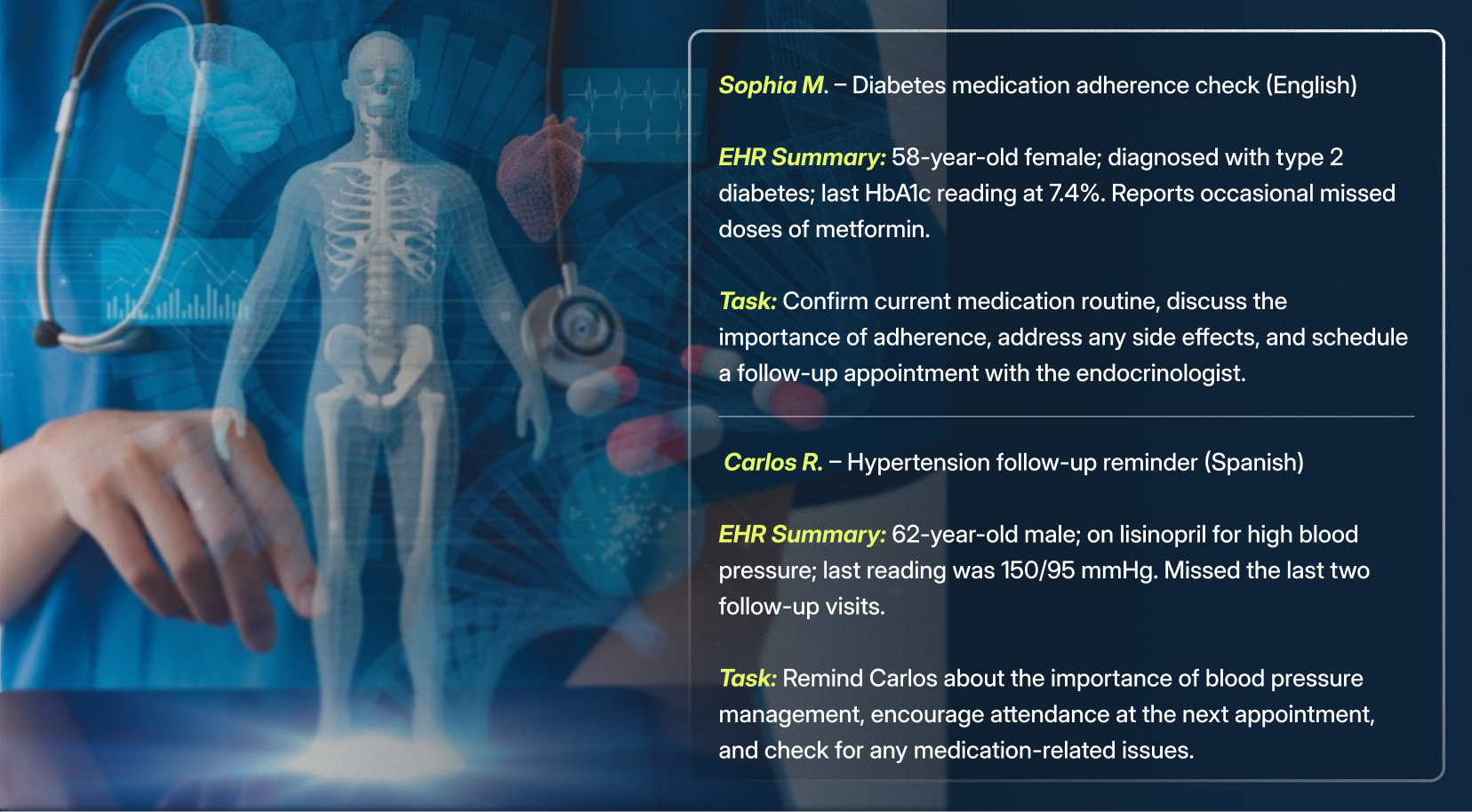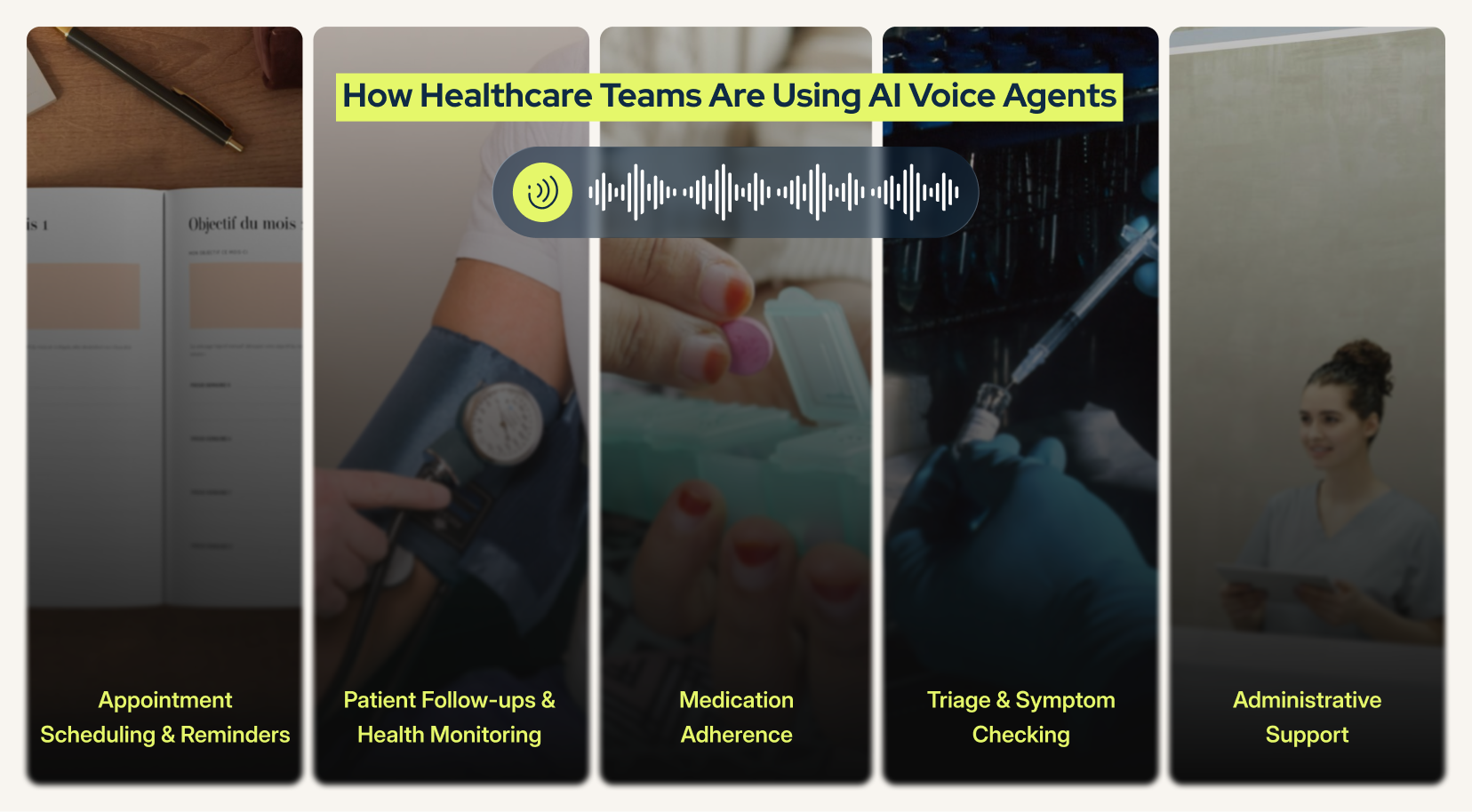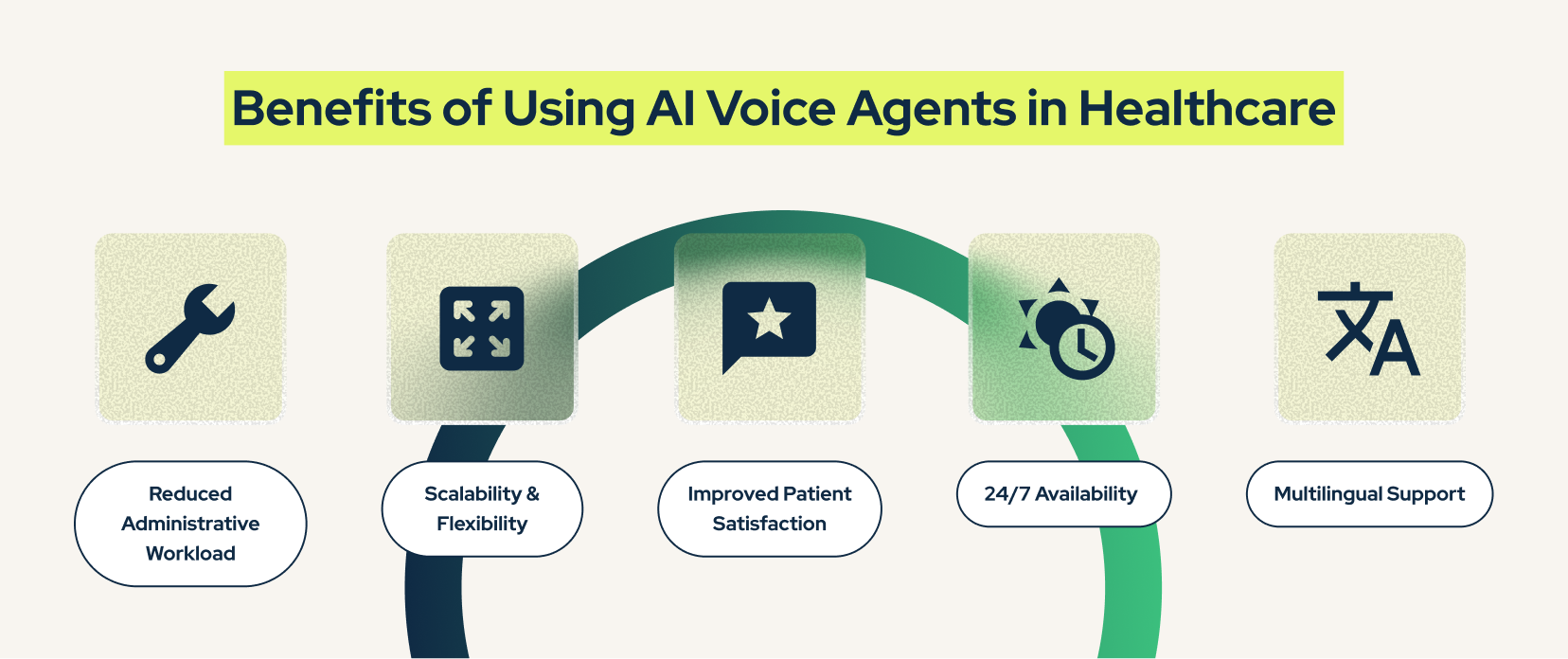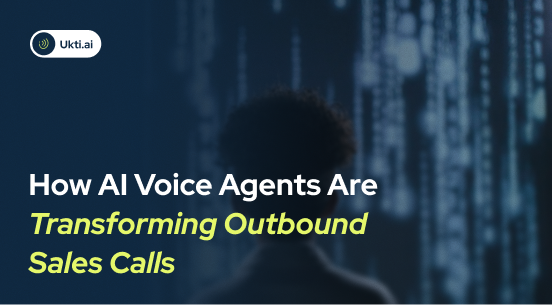Healthcare is one of the most complex and communication-intensive industries. Delays in response time, limited patient outreach, and overwhelmed staff contribute to reduced satisfaction, missed appointments, and care gaps. According to a 2023 Accenture study, nearly 60% of patients report frustration due to poor communication with healthcare providers, and no-show rates cost the healthcare system over $150 billion annually.
Voice AI agents are changing that. Healthcare teams now use them across patient touchpoints for proactive appointment reminders, post-discharge check-ins, mental health triage outreach, and insurance benefits verification calls. The result is 24/7 availability, human-like interactions, and measurable operational savings.
This blog will walk you through:
- What voice AI agents are
- How they work behind the scenes
- Ten real-world use cases that are improving healthcare delivery today
What Are AI Voice Agents in Healthcare?
AI voice agents in healthcare are virtual assistants powered by artificial intelligence that interact with patients through spoken language. Using a combination of automatic speech recognition (ASR), natural language processing (NLP), and machine learning, these agents can understand, process, and respond to patient queries much like a human receptionist or call center agent.
Unlike traditional IVR (Interactive Voice Response) systems that rely on rigid menus and keypad inputs, modern AI voice agents are conversational. This allows patients to speak naturally, making interactions faster and more intuitive. These agents can proactively reach out to patients, helping to close communication gaps before they impact care.

Key Features of AI Voice Agents:
- Conversational Interface: Patients can speak in complete sentences rather than pressing buttons.
- 24/7 Proactive Engagement: AI agents can place calls at any hour, ensuring time-sensitive reminders, wellness checks, or urgent follow-ups are delivered without being limited to clinic hours.
- Multilingual Capabilities: Support for multiple languages and dialects improves accessibility for diverse patient populations.
- Integration with EHRs/EMRs: Voice agents can access relevant patient information before placing calls, making conversations more personalized and efficient.
By bridging the gap between patients and healthcare systems, AI voice agents help reduce no-shows, improve adherence to care plans, and ensure critical updates are delivered without relying solely on the patient to reach out first.
Key Use Cases of AI Voice Agents in Healthcare

AI voice agents are being adopted across healthcare settings to streamline operations and improve patient engagement. Here are some of the most impactful ways they’re being used today:
1. Appointment Scheduling & Reminders
AI voice agents can place automated calls to remind patients of upcoming visits, confirm attendance, or reschedule if needed. This proactive outreach significantly reduces no-show rates and optimizes clinic schedules.
2. Patient Follow-ups & Health Monitoring
AI voice agents can automate post-discharge follow-ups to monitor recovery progress, symptoms, or medication use. For chronic condition management, these agents can conduct regular conversational health surveys, helping providers catch early warning signs and deliver timely interventions.
3. Medication Adherence
One of the most significant challenges in patient care is ensuring medication adherence. Voice agents can deliver timely reminders and instructions for prescribed medications, ensuring adherence to treatment plans. If a patient misses multiple doses or responds with concern, the system can trigger an alert for a care coordinator to follow up.
4. Triage & Symptom Checking
Voice agents can assist in the initial triage process by asking patients about their symptoms and guiding them toward the appropriate level of care. When integrated with EMR systems, they can also retrieve patient history to ensure more accurate and informed routing.
5. Administrative Support
AI agents can verify insurance details before appointments, share billing updates, and notify patients when lab results are ready. This reduces the burden on administrative staff and ensures patients receive important information without having to call in.
Benefits of Using AI Voice Agents in Healthcare

Implementing AI voice agents is not just about automating tasks. It is about reimagining how healthcare providers reach, engage, and manage their patient communities. Voice agents combine efficiency, accessibility, and scalability, delivering measurable benefits to both patients and providers.
Here’s a closer look at the key advantages:
1. Reduced Administrative Workload
AI voice agents can handle repetitive yet time-consuming patient contacts such as confirming appointments, reminding about follow-ups, and verifying insurance before visits with speed and consistency.
Impact:
- Free front-desk and call center teams to focus on high-value interactions like complex patient coordination.
- Reduces burnout among healthcare professionals who balance clinical and administrative duties.
- Supports leaner staffing models without compromising patient outreach quality.
2. Improved Patient Satisfaction
In today’s digital-first world, patients expect faster, more convenient ways to access care. AI voice agents proactively deliver reminders, updates, and important information without making patients wait for office hours or navigate complex phone menus.
How It Helps:
- Timely outreach on upcoming appointments, prescription refills, or test result availability.
- Communication tailored to patient schedules, improving convenience.
- Builds trust by showing providers are engaged in patients’ care journeys.
3. Scalability & Flexibility
AI voice agents can handle a surge in patient communication during high-demand periods such as flu season, vaccination drives, or public health emergencies without the cost and delay of scaling human teams.
What This Means:
- Can place hundreds or thousands of calls simultaneously without wait times or fatigue.
- No additional overheads for overtime pay or lengthy training cycles.
- Enables expansion of outreach programs without major infrastructure costs.
4. 24/7 Availability
Unlike human teams limited by shifts, AI voice agents can deliver calls around the clock, ensuring time-sensitive updates reach patients when they are most likely to respond.
Key Advantages:
- Late-night or early-morning reminders for patients with non-traditional work schedules.
- Immediate delivery of critical instructions after lab results or post-discharge notes are ready.
- Ensures that important care information is never delayed by office hours.
5. Multilingual Support
Serving diverse populations means overcoming language barriers in patient communication. Outbound AI voice agents equipped with multilingual capabilities can deliver reminders, wellness checks, and instructions in the patient’s preferred language.
Benefits:
- Improves comprehension and comfort for non-English speakers.
- Reduces the need for human interpreters in routine outreach.
- Ensures inclusive communication across all patient engagement efforts.
Challenges and Limitations of AI Voice Agents in Healthcare
While AI voice agents offer significant benefits to healthcare systems, they also come with challenges that providers must carefully address. Thoughtful planning is essential to ensure safe, ethical, and effective implementation.
1. Data Privacy and HIPAA Compliance
One of the most critical concerns in deploying AI voice agents in healthcare is ensuring patient data security and compliance with regulations like HIPAA (Health Insurance Portability and Accountability Act) in the U.S. or GDPR in Europe.
AI voice agents handle sensitive details including patient names, medical histories, appointment schedules, and insurance information. Any data breach could have serious legal and ethical consequences.
Key Risks:
- Storing patient call data longer than necessary
- Sharing data with third-party services without explicit patient consent
- Inadequate access controls that allow unauthorized staff to view sensitive information
Best Practices:
- Implement strict access permissions so only authorized personnel can review patient data
- Partner only with vendors that can demonstrate HIPAA-compliant infrastructure and processes
- Establish clear data retention policies and delete call data once it is no longer needed
- Communicate transparently with patients about how their information will be used and stored.
2. Trust and Accuracy Concerns
Healthcare is a personal and high-stakes domain. Patients and staff must trust that AI systems will provide correct information, understand intent accurately, and escalate to a human when necessary.
AI voice agents can sometimes misinterpret accents, dialects, background noise, or medically complex terminology. In outbound scenarios, this risk is heightened because the patient has not initiated the call and may be less prepared to share detailed information.
Key Concerns:
- Misunderstanding patient symptoms or intent
- Failure to detect urgency in a patient’s voice tone
- Providing outdated or incorrect medical information
Solutions:
- Regularly train AI models on diverse speech datasets and medical vocabularies
- Maintain human-in-the-loop escalation for uncertain or high-risk cases
- Clearly define the scope so AI voice agents support rather than replace clinical decision-making
3. Patient Engagement and Response Rates
One of the biggest challenges in outbound healthcare calls is reaching patients at the right time and keeping them engaged. Spam fatigue means many people ignore unknown numbers, and even when they do answer, they may hang up if the call feels robotic or comes at an inconvenient moment.
Barriers Include:
- Low answer rates due to unfamiliar caller IDs
- Calls made during busy or inconvenient hours
- Early hang-ups if the opening feels scripted or impersonal
Recommendations:
- Use recognizable caller IDs or branded phone numbers where possible
- Clearly identify the purpose of the call within the first few seconds
- Leverage AI analytics to identify peak answer times based on patient demographics and historical call data
- Combine outbound calls with complementary channels like SMS or email to ensure critical messages are received
4. Integration Complexity with Legacy Systems
Healthcare providers often rely on older IT systems that are not designed to integrate easily with modern AI platforms. Connecting AI voice agents to existing infrastructure can require significant technical effort, particularly if different departments use siloed systems.
Common Issues:
- Lack of APIs or middleware for seamless data exchange
- Data format incompatibilities between EMRs and AI platforms
- Delays in updating records or syncing across systems
Possible Solutions:
- Partner with vendors experienced in healthcare system integration
- Use middleware solutions that standardize data flow across platforms
- Begin with non-integrated use cases, such as appointment reminders, and scale up as integration capacity improves
Despite these challenges, AI voice agents show strong promise in healthcare. Success depends on thoughtful implementation that balances innovation with regulation, automation with empathy, and AI with human oversight. When built with trust, accessibility, and compliance in mind, they can become a powerful tool for improving care delivery without compromising patient safety or experience.
The Future of AI Voice Agents in Healthcare
As voice technology continues to evolve, its role in healthcare will only grow. Here's what we can expect:
1. Smarter, Empathetic Conversations with Large Language Models
With the rise of advanced LLMs, voice agents will become more conversational, emotionally intelligent, and context-aware. They will be able to:
- Detect patient anxiety or confusion through tone during follow-up calls
- Offer empathetic responses that build trust and engagement
- Personalize conversations based on previous interactions and care history
2. Integration with Wearable Health Tech & IoT
AI voice agents could be triggered automatically when connected devices detect health concerns. For example, if a smartwatch records an irregular heartbeat, the system could:
- Place an immediate call to check on the patient’s condition
- Deliver automated alerts for abnormal readings in real time
- Provide hands-free guidance for users managing chronic conditions
3. Enhanced Role in Telehealth & Virtual Assistants
AI voice agents will increasingly assist with pre-visit patient outreach for virtual appointments. They will be able to:
- Conduct check-ins to gather vitals and symptoms before the consultation
- Share summaries of these conversations directly with clinicians
- Assist providers by retrieving relevant records and reducing documentation time
4. Predictive Voice AI for Early Detection and Preventive Care
Emerging research indicates that voice biomarkers can aid in detecting early signs of certain conditions, such as respiratory issues, depression, or even Parkinson’s disease.
In the future, AI voice systems could:
- Passively monitor changes in speech patterns
- Flag potential health concerns before symptoms escalate
- Help patients and providers take proactive action
Final Thoughts
From reducing missed appointments to enabling timely follow-ups, outbound AI voice agents are reshaping how healthcare providers connect with patients. By combining proactive engagement with human-like conversations, they close communication gaps that lead to care delays, improve adherence to treatment plans, and free staff from repetitive calling tasks.
The future holds even greater potential. As AI voice technology integrates with wearable health devices, leverages predictive analytics, and becomes more empathetic through large language models, healthcare organizations will be able to engage patients in ways that are both highly personalized and scalable.
If your healthcare team is looking to improve patient outreach, boost engagement, and reduce operational strain, Ukti AI can help. Our AI voice agents are built to handle high-volume outbound campaigns while maintaining the warmth and clarity of a human conversation.
Book a demo today and see how Ukti AI can help your organization reach more patients, at the right time, with the right message.
.png)


